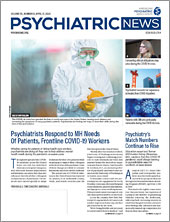Are you looking forward to reading another piece about COVID-19? Did you expect to be doing your residency training in the midst of a public health crisis? I am guessing that the majority of us would say no to both questions. While residency training is stressful in itself, the pandemic has added a whole new level of stress that we could not have anticipated.
These are unprecedented times. You may be on a roller-coaster of emotions, including a sense of instability, confusion, and panic, but these feelings are normal. While we want to help our patients in this pandemic, we may begin to fear that our feelings may impede our ability to learn and care for our patients. We need to recognize how our own distress can impact our feelings of competency and well-being.
You are not alone in trying to deal with your reactions. I would like to share with you a toolkit of some of the tips I am using and consider helpful at this time. The goal is to find serenity in the midst of the storm.
•
Acceptance: Start accepting the current situation for what it is. The sooner you accept it, the more ready you will be to problem solve.
•
Resilience: Find a resilient role model who has coped well in tough times and reach out to that person. See what he or she has done to handle tough situations.
•
Communication: Reach out to residents or staff and share your feelings and experiences in regard to the crisis.
•
Connectedness: Stay connected to your friends and family. Find a support network. This is the best time to allow yourself frequent access to social media to stay connected and feel a sense of camaraderie. Social distancing does not mean isolation.
•
Well-being: Utilize methods to manage or reduce your stress, including mindfulness, healthy diet, exercise, and rest.
Reaching out to talk about my experiences and staying connected is comforting me and gives me a sense of collegiality and optimism. In fact, a recent poll conducted by APA found that nearly half of the respondents (48%) have anxiety around getting infected with COVID-19, and even more (62%) worry about their loved ones becoming infected. More than half of respondents (59%) feel that COVID-19 has a serious impact on their day-to-day living. While this poll is not specific to psychiatry residents, it highlights the anxiety and disruption caused by the COVID-19 pandemic.
As psychiatry residents, we ought to be role models in learning how to self-regulate our emotions and reaching out to our colleagues in nonpsychiatric residency programs to offer them support and a sense of connectedness. My goal in writing this article is to share my experience with other residents who are going through this unprecedented event and to let them know they are not alone. We can and will do this together. In the end, the center of a tornado is quiet, peaceful, and calm. ■

